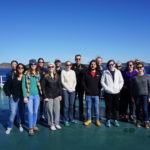Project ICY-LAB (Isotope CYcling in the LABrador Sea), led by SponGES participant Kate Hendry (School of Earth Sciences, University of Bristol), came to an end this week after a really successful trip, and now the research vessel, the RRS Discovery, is returning to UK waters.
The aims of ICY-LAB were to investigate the influence of meltwater coming from the Greenland Ice Sheet on the supply of nutrients to the oceans, and how this – in turn – impacts marine biology. Kate and her team will be using geochemistry, together with physical and biological data, to investigate the cycling of these important nutrients. Kate, together with fellow sponge enthusiast Claire Goodwin (Huntsman Marine Science Centre, Canada), also collected deep-sea sponges from understudied regions of the Labrador Sea, both for the ICY-LAB project and for SponGES.
The scientific crew spent about five weeks at sea, mostly near the western coast of Greenland, sampling waters, sediments and biology using a range of cutting-edge technologies. A Remotely Operated Vehicle (ROV) took high-definition, real time videos of the seafloor, and samples of biology (including sponges!), water and sediments.
ICY-LAB is funded by the European Research Council, awarded to Kate Hendry as an ERC Starting Grant. Thanks also to the Natural Environment Research Council, UK.
UPDATE (31 August 2017): Read the press release on the Bristol University website.
